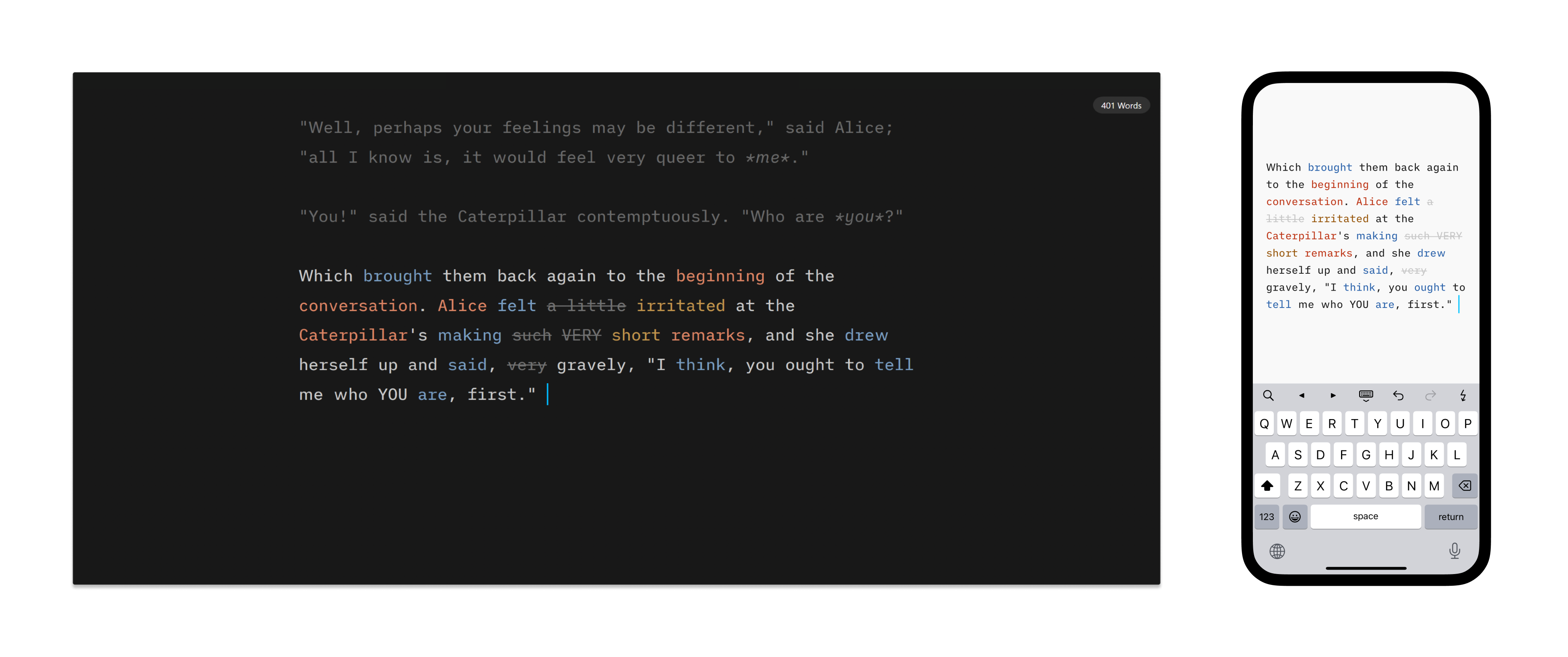In the final part of the series on writing your first novel, you’ll learn how create a writing setup and stay motivated.
The hardest part of writing a novel is making sure that you have focus. That means you need to sit down and start typing. That’s it. Nothing else matters. But before you can find your focus, you first need to be comfortable in the place you write—and stay motivated long enough to complete a first draft.
Time for a Gear Shift?
In our earlier posts we encouraged you to start with modest writing goals, then increase your daily word count over time. Are you ready to increase your output to 1,667 words a day? If you can maintain that number, you’ll have yourself a 50,000-word draft in just a few weeks.
But sometimes life gets in the way. You may feel disheartened. Or just tired. Writing a novel takes time, so remember to be kind to yourself on the journey.
So if you haven’t been able to increase your output, don’t worry. The important thing is to keep writing, every day—even if it’s just a few lines. It all adds up faster than you think.
1. Make Yourself Comfortable
Let’s take a closer look at your writing environment. Chances are you’ll be spending a lot of time there, so it’s worth making sure it’s nice and cosy. Try these ideas for starters:
- Tidy up your writing area
- Sit comfortably. Keep your display at eye level, if you can
- Declutter your desk. If you don’t use it, lose it
- Keep extra blankets and cushions nearby
- Organize your files and notes
- Stock up on stationery
- Make a mood board to stay inspired. Keep it in sight
- Your brain needs fuel: Stock up on snacks and drinks
- Set the mood with scented candles or incense
- Create a music playlist for writing, or try background ambiance, like sounds of nature, brown noise or iA’s Tokyo Focus Track playlist
Do you live with family or friends? Tell them you’re writing and need some time and space.
“You once said that you would like to sit beside me while I write. Listen, in that case I could not write at all. For writing means revealing oneself to excess; that utmost of self-revelation and surrender, in which a human being, when involved with others, would feel he was losing himself, and from which, therefore, he will always shrink as long as he is in his right mind… That is why one can never be alone enough when one writes, why there can never be enough silence around one when one writes, why even night is not night enough.” –Franz Kafka, Letters to Felice
And don’t forget to take breaks. Go for walks, be nice to the cat, sweep up some leaves. You’d be amazed how simple activities can clear your mind of cobwebs.
2. Set and Celebrate Milestones
By now you should have a decent idea of what you want to write, who the characters are, what world they inhabit, and how the story will play out. The last and arguably most important thing you need to keep doing is build on your writing habits and stay motivated.
“First forget inspiration. Habit is more dependable. Habit will sustain you whether you’re inspired or not. Habit will help you finish and polish your stories. Inspiration won’t. Habit is persistence in practice. You don’t start out writing good stuff. You start out writing crap and thinking it’s good stuff, and then gradually you get better at it. That’s why I say one of the most valuable traits is persistence.” –Octavia Butler.
Stay motivated by rewarding yourself when you achieve certain milestones.1 For example, Get yourself the latest book by your favorite author. Plan a nice dinner when you reach a big numbers, say every 10,000 words. Celebrate the small victories to keep your writing journey fun and rewarding to the very end.
3. Join a Writing Community
Writing is often seen as a solitary activity, but it doesn’t need to be. Think about joining a writing community to connect with other writers, either locally or online. Being part of a community can help you stay motivated and give you a safe space to share your ideas and insights.
“After 20 years of writing in basically a vacuum, I love being part of a community. I’ve vetted other writers’ contracts for them and do publicity for free just because I like a book. Some people think of it as hubris or careerism, but I love to champion books. You can’t use your whole sphere of influence just to help yourself.” –Jonathan Evison.
4. Master iA Writer
iA Writer isn’t just a minimalist writing app. It helps improve your writing too. Be sure to try out two features that can help:
- Style Check shows you fillers, redundancies, or clichés that could be creeping into your text—a great way to unlearn bad habits (and learn some good ones too)
- Syntax Highlight shows you patterns in your writing by highlighting different parts of speech, such as awkward verbs, repetitive nouns, or too many adjectives

Writing a novel isn’t easy. It’s a personal challenge you set yourself, but never forget about the rewards:
“Writing isn’t about making money, getting famous, getting dates, getting laid, or making friends. In the end, it’s about enriching the lives of those who will read your work, and enriching your own life, as well. It’s about getting up, getting well, and getting over. Getting happy, okay? Getting happy.” –Stephen King.
Good luck, and happy writing!





